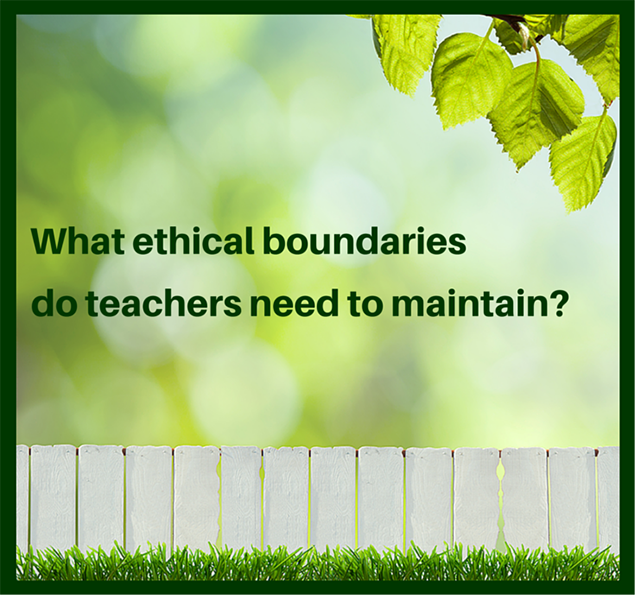What Ethical Boundaries do Teachers Need to Maintain?
Posted by Network Support · Leave a Comment
It is important for teachers, as professionals, to be culturally aware of how various habits and behaviors such as touch, eye contact, conversation topics, styles and personal space habits differ from person to person. Such awareness helps to set and maintain boundaries efficiently. There are many types of boundaries that we may encounter while we serve. For teachers, these boundaries can be understood under the following three categories.
1. Personal Boundaries: Personal boundaries protect both, the professional and the person they are serving, from any harm. Think of personal boundaries like overlapping circles. The same person might be a teacher, counselor, school volunteer, volleyball coach and church leader. Establishing and maintaining personal boundaries requires vigilance and self-awareness. Though there is a broad category of personal boundaries, we can further differentiate between the role and competence boundaries.
- Role boundaries pertain to occupational and vocational roles and tasks performed by the professional. For example, while the administrator may be responsible for developing the curriculum, the teacher’s role is to teach the curriculum. In order to avoid confusion and misunderstanding it is important for professionals to be clear about the expectations, understandings and goals regarding their roles. Open and honest communication is very important.
- Boundaries of competence refer to the capacities and power to do something reliably and effectively. For example, an accountant may be the most competent person to give an account of finances because it is within their scope or boundary of competence.
There are many other general boundaries in human relationships. These are characterized by accountability and responsibility in an education. For example, the principal is accountable to the superintendent of schools, who in turn is accountable to the Board of Education. The Board members are accountable to those who elect them.
2. Behavioral Boundaries: Behavioral boundaries involve observable actions, whether seen by others or not. Boundary concerns arise when there are secret, private or hidden relationship patterns. While there may be confidential, privileged and private conversations or encounters between professionals and the person they serve, it is generally considered best to be transparent and open.
3. Emotional Boundaries: Sometimes, professionals develop “emotional boundary violations.” This occurs when two people begin to share personal and emotionally intimate parts about themselves with those they ought not to share or be intimate. These relationships are usually hidden and can grow, creating distress, scandal and brokenness. On any given average day, men and women have approximately forty different types of feelings. These feelings or passions mostly emerge from a part of our brain called the limbic system and often exist “below our radar.” At times, in professional relationships we may encounter feelings that were unexpected. In such situations, though we cannot directly control our feelings, we can work to become more mindful of their presence. We can choose how we will respond to such feelings. For example, if we feel an extremely strong anger towards someone, we can choose to take a walk, count to 100 or do some purposeful work until we are calm again.
Teachers have a great deal of responsibility in developing others. There are several times at which a teacher might find some questions of concern in their own behaviors and boundaries. Being aware of ethical boundaries, makes it easier for us to ensure our own ethical practice. In addition to personal introspection in these areas, teachers who are open and honest with a mentor are often better able to cope with the challenges of ethical and professional behavior. It is thus wise to adopt a combination of personal reflection with regular accountability to a mentor, to ensure true ethical teaching practice.
Like this article for teachers?
Browse the Professional Learning Board COURSE CATALOG to find related online courses for teachers in your state. Professional Learning Board is a leading provider of online professional development classes that teachers use to renew a teaching license or renew a teaching certificate.





